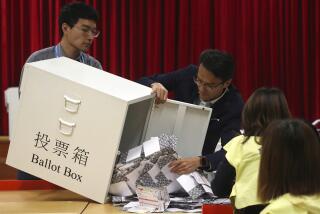POLITICS : Rebels in Japanese Premierâs Party Threaten a Showdown : A demand for nationwide election reform could precipitate Miyazawaâs fall.
TOKYO â A two-month debate in Parliament on reforms that could transform pork-barrel elections into policy-oriented battles is nearing the moment of truth.
By early June, Prime Minister Kiichi Miyazawa must make a decision if an unprecedented chance for reform is not to be lost, and reformers in the ruling Liberal Democratic Party have launched a challenge to force him to act.
âIf no bill has been enacted in the lower house by the end of the month, we will judge that Miyazawa has no intention of carrying out reform. That is the time limit,â declared Ichiro Ozawa, who bolted the partyâs largest faction last December to set up his own group of 44 followers. âAfter that, we wonât cooperate with Miyazawa or support him.â
Kazuo Aichi, an Ozawa lieutenant, cited a movement to overthrow Miyazawaâs Cabinet and oust him from office as one example of actions the group might take.
Aichi also noted that 35 of Ozawaâs 44 followers hold seats in the lower house and that their defection would deprive Miyazawaâs party of its majority in the chamber that picks the prime minister.
It is the first overt challenge to Miyazawaâs leadership since he became prime minister in November, 1991.
Last April, Miyazawaâs party and two opposition parties submitted two opposing sets of self-serving reform bills. But with the upper house dominated by the combination of six opposition parties and the lower house in the hands of the government, neither side can enact its proposals.
The key to resolving the deadlock, however, has appeared. Reformers on both sides support a proposal submitted by Masao Kamei, chairman of a Committee for Promotion of Political Reform backed by the powerful Keidanren (Federation of Economic Organizations). It combines the main points of the contradictory reform bills.
With the current session of Parliament ending June 20, lower house passage by early June is needed to leave enough time for approval by the upper house.
Kameiâs proposal would abolish Japanâs multi-seat constituencies and replace them with a combination of single-seat districts, to choose 300 representatives, and a proportional representation system of balloting, to elect 200 more. The key is the establishment of single-seat districts.
In his own five-seat constituency in Sendai, in which three Liberal Democrats traditionally win, victory--finishing fifth or better--âis not determined by the policies we offer during the campaign,â Aichi said. Indeed, with ruling party candidates battling each other, the biggest factors are âservice to the districtâ--meaning pork-barrel projects--and âhow much money you spend on a campaign.â
One-seat districts would revolutionize politics in Japan, Ozawa claims. Opposition parties ultimately would be forced to run a single strong candidate, and Liberal Democrats for the first time would be forced to win a majority of votes, rather than just 20% or 30%. Gradually, two major parties would emerge and a change in governments would become possible, he says. The Liberal Democratic Party and its predecessor parties have governed since 1946.
Campaigns in one-seat districts, Aichi said, would focus on policy and enable voters to participate in national decision-making for the first time.
Many critics, aware of the Japanese skill in changing forms without altering substance, remain skeptical. U.S. Ambassador Michael Armacost, for one, notes that the proposed reforms would leave untouched thousands of government licenses and permits. Businessmen, he argues, would still turn to politicians for intervention to obtain such documents--at a price.
Nonetheless, groups of younger members of four parties--in addition to the Ozawa faction--have declared themselves determined to act now. If reforms are not enacted, rebellion against both Miyazawa and leaders of the opposition could occur.
More to Read
Sign up for Essential California
The most important California stories and recommendations in your inbox every morning.
You may occasionally receive promotional content from the Los Angeles Times.










